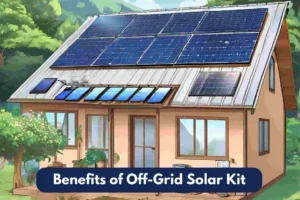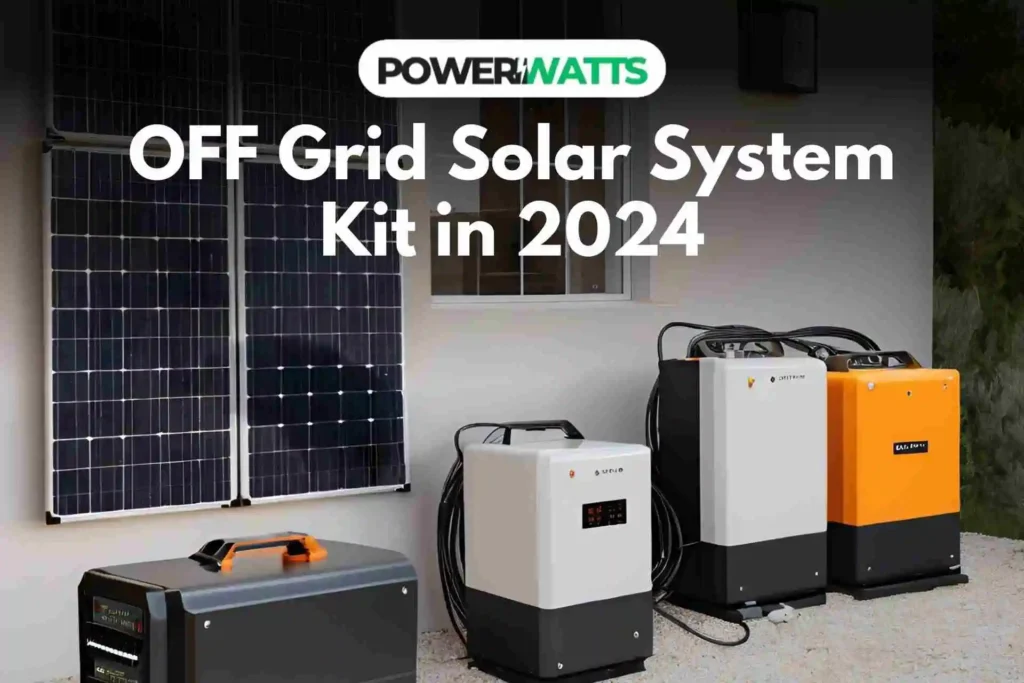Imagine generating your power, reducing your carbon impact, and enjoying energy independence’s piece of mind. Off-grid solar kits enable this goal for homeowners as well as travelers, and green-living enthusiasts.
Off-grid solar systems have become increasingly popular as users seek alternatives to utility electricity. According to the Solar Energy Industries Association reports off grid solar system have helped the U.S. solar sector expand 167% in the last decade. If you live in a distant place, want to prepare for crises, or want to cut your power expenses, an off-grid solar kit may help. But, if you don’t live in this area then do not worry Get a Quote. Our solar experts will help you according to your location and budget.
But with so many alternatives, how do you choose the proper off-grid solar system kit? This detailed tutorial will explain the basics of an off grid solar system. Solar panels, batteries, inverters, and charge controllers will be covered to help you make educated selections.
After reading this tutorial, I am sure you will know how to choose the finest off-grid solar system for your house. However, leave growing energy bills behind and embrace a solar-powered future. Now, explore off-grid solar and how to choose the best off-grid solar kit in 2024.
Overview of Off-Grid Solar Kits
As we all know, Off-grid solar kits transform energy independence and sustainability. So, the system turns solar energy into electricity and stores it. And is perfect for areas without grid connections.
Most off-grid solar kits include many critical components that work together to provide dependable and efficient electricity. These parts cooperate flawlessly to deliver clean, renewable energy as needed.
An Off-Grid Solar System Works
Off-grid solar systems turn solar energy into electricity. How it works as
- Solar panels convert sunlight into DC power.
- The charge controller controls electrical flow to charge batteries effectively and avoid overcharging.
- Batteries store electricity for nighttime or low-light applications.
- However, inverter transforms DC energy into AC to power household appliances and gadgets.
5 Components of Off-Grid Solar Kit System
Solar Panels:
Solar panels generate electricity from sunshine in your off-grid solar setup. Choose high-efficiency panels to enhance energy production in small spaces.
Charging Controller:
This electrical gadget controls solar panel-to-battery current flow to minimize overcharging and maximize battery life.
Batteries:
Created electricity is stored in batteries. My experience has shown that while lithium ion batteries are more expensive than lead-acid batteries and are more effective and have a longer lifespan.
Inverter:
The inverter transforms DC energy into AC electricity for household appliances and gadgets. Choose an inverter with MPPT (Maximum Power Point Tracking) for efficiency and data recording for system monitoring.
Accessories and Wiring:
Remember the wire and accessories required to connect your off-grid solar system’s components. Choose high-quality cables and connections for safety and performance.
How to Choose the Best Off-Grid Solar System
Off-grid solar systems are great for powering your house with clean, sustainable energy. I believe that generating your own power makes you self-sufficient and reduces your carbon impact. However, with so many possibilities, selecting the finest off-grid solar system for your house may be difficult. Now, you can choose the best off-grid solar kit by following these instructions such as
1. Assess Energy Needs:
Before building an off-grid solar system, assess your energy demands. First, calculate your household’s daily and monthly power usage. Take into account the amount of people, appliances, and devices you utilize. Your energy use trends can help you choose an efficient solar system.
2. Evaluate Your Solar Potential
Sunlight is crucial to your off-grid solar system’s performance. Check your solar resource statistics of the area such as average daily solar radiation and sunny days. However, this information can help you calculate how many solar panels to use to produce enough power. Consider shadowing from trees, buildings, and other barriers while placing solar panels.
3. Select solar panels
Any off-grid solar system relies on solar panels. Monocrystalline, polycrystalline, and thin-film panels exist. Monocrystalline panels are efficient and stylish. However, polycrystalline panels are cheaper and function well in low light. Thin-film panels are flexible and appropriate for uneven surfaces, but less efficient. Choose the finest off-grid solar panels based on money, space, and efficiency.
4. Choose an Efficient Inverter
Solar panels create DC, which an inverter converts into AC power. Choose an inverter that matches your solar panels’ capacity for best efficiency and compatibility. You may need a grid-tied or hybrid inverter. A grid-tied inverter lets you sell extra energy to the grid, while a hybrid inverter offers backup power during outages.
5. Buy Good Batteries:
Off-grid solar systems store daytime power in batteries for nighttime or overcast usage. That’why, you need quality batteries for the best performance and lifespan. Most batteries are lead-acid, which is affordable and reliable.
6. Extra Components
Off-grid solar systems may need extra components beyond those listed above. Charge controllers govern solar panel-to-battery energy transfer, and a backup generator is used in emergencies or low sunshine. However, investment in high-quality components improves system dependability and durability.
I believe, choosing the ideal off-grid solar system for your house involves careful preparation. So, Get a Quote. We help you to make an educated option that fits your energy objectives and budget. Use the greatest off-grid solar system to power your house and make it greener.
We Are suggest you to read best portable solar panels.

Important Benefits of Off-Grid Solar Kit
Energy Independence:
Creating your own power with an off-grid solar system is a major advantage. This independence from the power grid eliminates energy price fluctuations and disruptions. However, sunlight can provide steady electricity for your house.
Cost savings:
Off-grid solar kits may significantly reduce power expenditures. Many off-grid systems are DIY and save you money on solar installation.
Environmental Impact:
Solar energy cuts carbon emissions. Off-grid living helps fight climate change and promotes sustainability since solar electricity is clean and renewable. I believe renewable energy improves the environment and healthy lives.
Flexible and Versatile:
Off-grid solar kits may be customized to match your energy demands, making them appropriate for distant houses, RVs, and cottages.
In an emergency, an off-grid solar system supplies electricity. Your solar system can power important appliances when the grid goes out.
Installation Procedure of off Grid Solar System:
Off-grid solar home system kits are a great alternative for renewable energy enthusiasts because of their energy independence, financial savings, environmental advantages, flexibility, and disaster readiness.
With modern kits that contain everything, installing an off-grid solar kit is easy. Most off-grid solar kits include solar panels, batteries, an inverter, a charge controller, and all the connections and connectors, making installation straightforward for DIYers. Installation procedure usually comprises these steps:
Plan and Prepare:
Assess your energy demands to find the right solar kit size. Locate your solar panels for optimum daily sunshine.
Panel Security:
Mount the solar panels firmly on the racking system. This stage may need basic tools and physical work, although the package normally includes thorough instructions.
Component Connection:
Run connections from the solar panels to the charge controller, which controls battery power. Next, you must connect the batteries to the inverter to convert DC electricity into AC for your appliances.
Final Checks:
Double-check all connections and security after connecting everything. Before utilizing the system, have a licensed electrician inspect it.
While a novice DIYer can install, careful planning and attention to detail are required. Users like saving money, feeling accomplished, and controlling their energy source.
Conclusion
It is abundantly evident from looking over off-grid solar kits that a system may alter your energy use. Examining your energy use, solar potential, and component quality can help you create a stable and effective off-grid solar system that fits your requirements.
Choosing the best off-grid solar kit is more than just running your home and it is about lowering your carbon footprint and leading a sustainable lifestyle. As renewable energy gains popularity now is the time to investigate an off-grid solar system.
Waiting for what? Start studying off-grid solar kits now to achieve energy independence. Off-grid solar systems may offer a stable and sustainable power option for years, whether you live in a distant place, want to prepare for crises, or want to cut your energy expenses. Ready to leap? Get a Quote now to learn how to use the sun to fuel your life!


